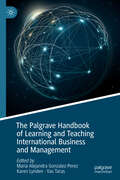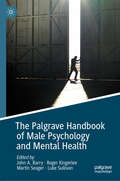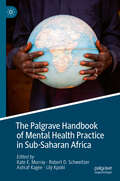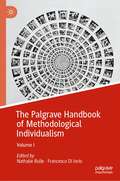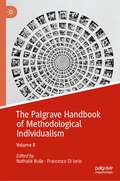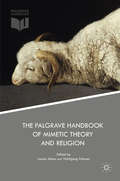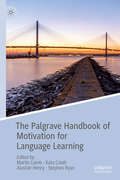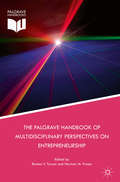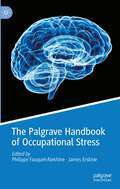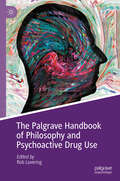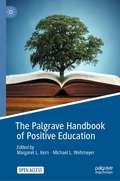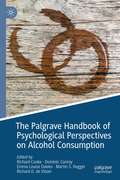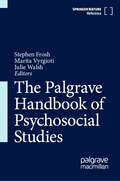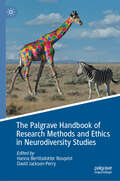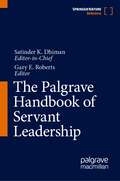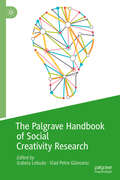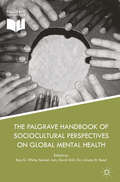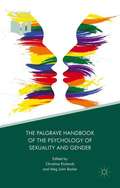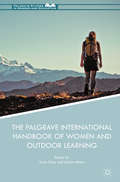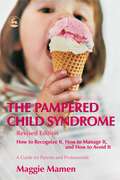- Table View
- List View
The Palgrave Handbook of Learning and Teaching International Business and Management
by Vas Taras Maria Alejandra Gonzalez-Perez Karen LyndenThis handbook, which serves as a follow-up text to The Palgrave Handbook of Experiential Learning In International Business, reviews theoretical and empirical approaches of experiential learning pedagogy, and its role in increasing the effectiveness in teaching and learning of international business, and also, in the incorporation of international business-related concepts and competences in business and non-business programs. This edition offers a broader and updated perspective on experiential learning pedagogy for international business and management, and beyond. The first part provides an updated overview of the theories of experiential learning and effectiveness of teaching and learning in international business through the use of experiential learning projects. Part two provides a collection of specific applications of experiential learning in International Business and related fields. This handbook is a one-stop source for international managers, business educators, and trainers seeking to either select and use an existing experiential learning project or develop new projects and exercises of this kind.
The Palgrave Handbook of Male Psychology and Mental Health
by Luke Sullivan John A. Barry Roger Kingerlee Martin SeagerThis Handbook represents the first concerted effort to understand male mental health in a way that facilitates a positive step forward in both theory and treatment. An alarming number of men experience serious mental health issues, as demonstrated by high rates of suicide and violent offending. Despite these problems, the study of male psychology has either been overlooked, or viewed as a problem of defective masculinity. This handbook brings together experts from across the world to discuss men’s mental health, from prenatal development, through childhood, adolescence, and fatherhood. Men and masculinity are explored from multiple perspectives including evolutionary, cross-cultural, cognitive, biological, developmental, and existential viewpoints, with a focus on practical suggestions and demonstrations of successful clinical work with men.Throughout, chapters question existing models of understanding and treating men’s mental health and explore new approaches, theories and interventions. This definitive handbook encapsulates a new wave of positive theory and practice in the field of male psychology and will be of great value to professionals, academics, and those working with males through the lifespan in any sector related to male mental health and wellbeing.
The Palgrave Handbook of Mental Health Practice in Sub-Saharan Africa
by Kate E. Murray Robert D. Schweitzer Ashraf Kagee Lily KpobiThe focus of this handbook is to highlight the key issues in addressing the challenges and opportunities to promote mental health is Sub-Saharan Africa. A unique feature of this work is the privileging of African voices in expressing the strengths, vulnerabilities, and unique approaches which have been found within the Sub-Saharan context. The handbook is broken into three sections. The first introduces the handbook and the general issues and concepts discussed. The second describes diverse community outreach and mental health interventions applied by the contributors in diverse Sub-Saharan Africa countries and contexts and addressing a range of mental health topics. The third focuses on systemic issues that affect mental health service delivery, with recommendations provided. Opportunities for creating new models for sharing practices and disseminating knowledge generated by Sub-Saharan African practitioners for their culture and contexts are discussed.
The Palgrave Handbook of Methodological Individualism: Volume I
by Francesco Di Iorio Nathalie BulleWhile methodological individualism is a fundamental approach within the social sciences, it is often misunderstood. This highlights the need for a discursive and up-to-date reference work analyzing this approach’s classic arguments and assumptions in the light of contemporary issues in sociology, economics and philosophy. This two-volume handbook presents the first comprehensive overview of methodological individualism. Chapters discuss historical and contemporary debates surrounding this central approach within the social sciences, as well as cutting edge developments related to the individualist tradition with philosophical and scientific implications. Bringing together multiple contributions from the world’s leading experts on this important tradition of theorizing, this collective endeavor provides teachers, researchers and students in sociology, economics, and philosophy with a reliable and critical understanding of the founding principles, key thinkers and intellectual development of MI since the late 19th century.
The Palgrave Handbook of Methodological Individualism: Volume II
by Francesco Di Iorio Nathalie BulleWhile methodological individualism is a fundamental approach within the social sciences, it is often misunderstood. This highlights the need for a discursive and up-to-date reference work analyzing this approach’s classic arguments and assumptions in the light of contemporary issues in sociology, economics and philosophy. This two-volume handbook presents the first comprehensive overview of methodological individualism. Chapters discuss historical and contemporary debates surrounding this central approach within the social sciences, as well as cutting edge developments related to the individualist tradition with philosophical and scientific implications. Bringing together multiple contributions from the world’s leading experts on this important tradition of theorizing, this collective endeavor provides teachers, researchers and students in sociology, economics, and philosophy with a reliable and critical understanding of the founding principles, key thinkers and intellectual development of MI since the late 19th century.
The Palgrave Handbook of Mimetic Theory and Religion
by James Alison Wolfgang PalaverThe Palgrave Handbook of Mimetic Theory and Religion draws on the expertise of leading scholars and thinkers to explore the violent origins of culture, the meaning of ritual, and the conjunction of theology and anthropology, as well as secularization, science, and terrorism. Authors assess the contributions of Ren#65533; Girard's mimetic theory to our understanding of sacrifice, ancient tragedy, and post-modernity, and apply its insights to religious cinema and the global economy. This handbook serves as introduction and guide to a theory of religion and human behavior that has established itself as fertile terrain for scholarly research and intellectual reflection.
The Palgrave Handbook of Motivation for Language Learning
by Kata Csizér Stephen Ryan Alastair Henry Martin LambThis handbook offers an authoritative, one-stop reference work for the dynamic and expanding field of language learning motivation. The 32 chapters have been specially commissioned from the field’s most influential researchers and writers. Together they present a compelling picture of the motivations people have for learning languages, the diverse ways we can research motivation, and the implications for promoting and sustaining learners’ motivation. The first section outlines the main theoretical approaches to language learning motivation; the next section presents ways in which motivation theory has been applied in practice; the third section showcases examples of motivation research in particular contexts and with particular types of language learners; and the final section describes the exciting directions that contemporary research is taking, promising important new insights for academics and practitioners alike.
The Palgrave Handbook of Multidisciplinary Perspectives on Entrepreneurship
by Romeo V. Turcan Norman M. FraserDeparting from the traditional approach of surveying current and future trends and developments, this unique Handbook brings phenomena, theories, and concepts from multiple disciplines together to advance entrepreneurship. With original contributions from authors who are experts in their fields, the collection offers state-of-the-art insights into generating new areas for research, new theories and concepts, and new questions for policy debates – all aimed at advancing entrepreneurship. Divided into four sections and covering perspectives such as neuroscience, theology, organisational behavior and education, The Palgrave Handbook of Multidisciplinary Perspectives on Entrepreneurship is a rich source of information for researchers, educators, entrepreneurs, leaders and managers.
The Palgrave Handbook of Occupational Stress
by Philippe Fauquet-Alekhine James ErskineThis handbook brings together an international group of experts to offer a comprehensive resource on occupational stress. Including both theoretical and practical perspectives, it examines ways to reduce and treat stress, as well as the physiological, psychosocial, and neural underpinnings of it. Through 24 original and carefully selected essays, the authors offer new insights, resources, and tools to better understand, manage and treat stress in a professional environment.The book’s chapters are divided into 5 parts that address the conceptualisation of stress; present theoretical models (including the contribution of animal models); examine the psychological and physiological aspects of stress and ways to assess it; delve into psychosocial risks at work and their assessment (means and methods); and investigate how to cope with stress at work, including resilience training. Aspects such as the effects of leadership, simulation training, and stress-tests for hiring are also presented and discussed. The volume ends by exploring broader considerations regarding stress and culture, stress and occupational sectors (with a chapter focusing on studentship), and the pharmacology of stress. This handbook is an essential reference for researchers in organisational psychology, as well as business and management and education, who are interested in stress. Healthcare workers and therapists who treat stress will also find an invaluable resource in this far-reaching yet accessible collection.
The Palgrave Handbook of Philosophy and Psychoactive Drug Use
by Rob LoveringIn this Handbook, philosophers from around the world address the metaphysics, epistemology, and value of psychoactive (mind-altering) drug use. In so doing, they attempt to answer questions such as: What does the fact of drug-induced mind-altering experiences tell us about natures of the mind, free will, and God? What does it tell us about what, and how, we can know? Are drug-induced mind-altering experiences valuable, morally, aesthetically, or otherwise? Is the acquisition of drug-induced mind-altering experiences ever immoral? Should the acquisition of drug-induced mind-altering experiences ever be legally prohibited? The Handbook gives an overview of the current research, and sets the stage for future directions in philosophical thought relating to psychoactive drug use.
The Palgrave Handbook of Positive Education
by Michael L. Wehmeyer Margaret L. KernThis open access handbook provides a comprehensive overview of the growing field of positive education, featuring a broad range of theoretical, applied, and practice-focused chapters from leading international experts. It demonstrates how positive education offers an approach to understanding learning that blends academic study with life skills such as self-awareness, emotion regulation, healthy mindsets, mindfulness, and positive habits, grounded in the science of wellbeing, to promote character development, optimal functioning, engagement in learning, and resilience.The handbook offers an in-depth understanding and critical consideration of the relevance of positive psychology to education, which encompasses its theoretical foundations, the empirical findings, and the existing educational applications and interventions. The contributors situate wellbeing science within the broader framework of education, considering its implications for teacher training, education and developmental psychology, school administration, policy making, pedagogy and curriculum studies.This landmark collection will appeal to researchers and practitioners working in positive psychology, educational and school psychology, developmental psychology, education, counselling, social work and public policy.
The Palgrave Handbook of Positive Psychology and Health
by Fuschia M. SiroisThis handbook brings together the two rapidly growing subfields of psychology, Positive Psychology and Health Psychology. It provides evidence-based and theory-driven perspectives on the potential benefits of focusing on and cultivating character strengths, positive states and traits for optimizing physical health and related outcomes in both general and medical populations. The handbook is divided into four sections, with the first three covering classic Western positive psychological domains and their relations to physical health: Hedonic well-being (Positive Emotions), Eudaimonc well-being (Meaning, Purpose and Values), and Character Strengths. The fourth section takes a novel Eastern perspective to positive states and traits by examining the role of mindfulness and self-compassion in health-related pathways and outcomes. This handbook provides an overview of how positive psychological concepts and interventions can be integrated into research and practice aimed at improving people&’s health. It offers a valuable resource for students and scholars of psychology, and mental and behavioural health; as well as for physicians and allied health professionals.
The Palgrave Handbook of Power, Gender, and Psychology
by Rose Capdevila Eileen L. ZurbriggenThe Palgrave Handbook of Power, Gender, and Psychology takes an intersectional feminist approach to the exploration of psychology and gender through a lens of power. The invisibility of power in psychological research and theorizing has been critiqued by scholars from many perspectives both within and outside the discipline. This volume addresses that gap. The handbook centers power in the analysis of gender, but does so specifically in relation to psychological theory, research, and praxis. Gathering the work of sixty authors from different geographies, career stages, psychological sub-disciplines, methodologies, and experiences, the handbook showcases creativity in approach, and diversity of perspective. The result is a work featuring a chorus of different voices, including diverse understandings of feminisms and power. Ultimately, the handbook presents a case for the importance of intersectionality and power for any feminist psychological endeavor.
The Palgrave Handbook of Prison Design (Palgrave Studies in Prisons and Penology)
by Yvonne Jewkes Dominique Moran Kwan-Lamar Blount-Hill Victor St. JohnThis handbook brings together expertise from a range of disciplinary perspectives and geographical contexts to address a key question facing prison policymakers, architects and designers – what kind of carceral environments foster wellbeing, i.e. deliver a rehabilitative, therapeutic environment, or other ‘positive’ outcomes? The Palgrave Handbook of Prison Design offers insights into the construction of custodial facilities, alongside consideration of the critical questions any policymaker should ask in commissioning the building of a site for human containment. Chapters present experience from Australia, Chile, Estonia, Ireland, New Zealand, Norway, Russia, the United Kingdom, and the United States – jurisdictions which vary widely in terms of the history and development of their prison systems, their punitive philosophies, and the nature of their public discourse about the role and purpose of imprisonment, to offer readers theories, frameworks, historical accounts, design approaches, methodological strategies, empirical research, and practical approaches.
The Palgrave Handbook of Psychological Perspectives on Alcohol Consumption
by Dominic Conroy Martin S. Hagger Richard Cooke Emma Louise Davies Richard O. de VisserThis Handbook provides a broad and comprehensive overview of psychological research on alcohol consumption. It explores the psychological theories underpinning alcohol use and misuse, discusses the interventions that can be designed around these theories, and offers key insight into future developments within the field.A range of international experts assess the unique factors that contribute to alcohol-related behaviour as differentiated from other health-related behaviours. They cover the theory and context of alcohol consumption, including possible implications of personality type, motivation and self-regulation, and cultural and demographic factors. After reviewing the evidence for psychological theories and predictors as accounts for alcohol consumption, the book goes on to focus on external influences on consumption and interventions for reducing alcohol consumption, including those based on purchasing and consumption behaviour, technologies such as personalised feedback apps, and social and media phenomena such as “Dry January” and “Hello Sunday Morning”. It brings together cutting-edge contemporary research on alcohol consumption in childhood and adolescence, including topics such as managing offers or drinks, “pre-drinking”, online identities, how children develop their beliefs about alcohol and how adolescents discuss alcohol with their parents. The book also offers a rounded presentation of the tensions involved in debates around the psychological impacts of alcohol use, discussing its role in helping people to socialise and unwind; as well as recognising the possible negative impacts on health, education and relationships. This book will be of interest to academics, policymakers, public health officials, practitioners, charities and other stakeholders interested in understanding how alcohol affects people psychologically. This book will also be a key resource for students and researchers from across the social sciences.
The Palgrave Handbook of Psychosocial Studies
by Stephen Frosh Julie Walsh Marita VyrgiotiOver the past decades, psychosocial studies has demonstrated its strengths and influence across diverse sites of theory and practice; it continues to grow as an area of transdisciplinary research that dialogues with psychoanalysis, sociology, critical psychology, cultural studies, gender and sexuality studies, and postcolonial studies. The Palgrave Handbook of Psychosocial Studies is the first Major Reference Work to explore the history and depth of the field and offer a critical evaluation of contemporary theories, empirical methods and practices of psychosocial studies. With 50 chapters, this state-of-the-art collection:· reflects back on texts that have influenced the development of psychosocial studies from a 2020s perspective· explores current major topics with evaluative reviews· identifies newly emerging areas ofenquiry · features a wide range of international psychosocial voices. Published chapters can be read and downloaded individually online: https://link.springer.com/referencework/10.1007/978-3-030-61510-9 The Palgrave Handbook of Psychosocial Studies is unique in covering a wide range of psychosocial topics and in being written accessibly from many different perspectives. It will appeal to students, scholars and practitioner-researchers alike.
The Palgrave Handbook of Research Methods and Ethics in Neurodiversity Studies
by Hanna Bertilsdotter Rosqvist David Jackson-PerryThis timely volume brings together well-established scholars and emerging voices to explore research methods and ethics in Neurodiversity Studies. It explores the epistemic injustice that currently surrounds much knowledge production around neurodivergence, and offers concrete examples of creative, participatory, and collaborative research practice in the field. The editors have assembled chapters combining reflexive, theoretical, and practical contributions. Together they address current debates surrounding participatory methods and Neurodiversity Studies and are unique in giving voice to mainly neurodivergent researchers and contributors across autism, ADHD, acquired brain injury, and multiple neurodivergence. The first of its kind, this much-needed volume contains essential reading for all those learning and teaching in the field of neurodiversity. It further represents a valuable resource for students and academics at all levels, participatory or creative researchers, research commissioners, and research evidence users across the social sciences.
The Palgrave Handbook of Servant Leadership
by Satinder K. DhimanThis reference work offers comprehensive perspectives on servant leadership. Featuring a cadre of leading world-class scholars, practitioners, and contributing authors from diverse fields of inquiry, it aims to collate research on servant leadership with a particular focus on its moral and spiritual dimensions.It is divided into sections that center on topics such as character, philosophical influences, diversity and inclusion, critiques of servant leadership as well as examples of servant leadersThough first introduced in the 1970 by Robert Greenleaf, the field of servant leadership is still lacking consensus on a definition and a theoretical framework. The goal of this reference work is to begin to fill this gap by assembling the scholarship of the top scholars in this field and providing a go-to source for information on the theory and practice of servant leadership. This handbook will serve as an essential resource for researchers, scholars, and students of organizational behavior, human resource management, and business ethics, as well as consultants and business leaders interested in discovering the best leadership models to suit contemporary organizations.
The Palgrave Handbook of Sexual Ethics
by David BooninThe Palgrave Handbook of Sexual Ethics is a comprehensive collection of recent research on the ethics of sexual behavior, representing a wide range of perspectives. It addresses a number of traditional subjects in the area, including questions about pre-marital, extra-marital, non-heterosexual, and non-procreative sex, and about the nature and significance of sexual consent, sexual desire, and sexual activity, as well as a variety of more recent topics, including sexual racism, sexual ableism, sex robots, and the #metoo response to sexual harassment. Each chapter defends a substantive thesis about the topic it addresses and the handbook as a whole thereby provides a strong foundation for future research in this important and growing field of inquiry.
The Palgrave Handbook of Social Creativity Research (Palgrave Studies in Creativity and Culture)
by Vlad Petre Glăveanu Izabela LebudaThis Handbook brings together an international cast of experts to explore the social nature and context of creativity studies, focusing on methodology as a key component in advancing the social study of creativity. Two decades on from the pioneering work of Alfonso Montuori and Ronald E. Purser, the authors present a timely appraisal of past and present work in social creativity studies, and look ahead to future developments within this field. The authors collectively offer a rigorous examination of the methodological and empirical issues and techniques involved in studying social creativity. They examine the phenomenon as a form of communication and interaction within collaborative relationships; contending that creativity happens not within a vacuum but instead from a nexus of personal, social and contextual influences.This comprehensive work is organized in three parts, focusing first on the various methodological approaches applicable to the social in creativity studies. It secondly turns to empirical findings and approaches relating to the social nature of creativity. In the book’s final part, the authors offer reflections on the state of social research into creativity, pinpointing areas requiring further methodological scrutiny and empirical verification, and areas that may inspire further theoretical or applied work. Combining classic ideas with cutting-edge, emerging methods, this work provides a vital methodological ‘toolbox’ for investigators within social creativity.
The Palgrave Handbook of Sociocultural Perspectives on Global Mental Health
by Ross G. White Sumeet Jain David M.R. Orr Ursula M. ReadThis handbook incisively explores challenges and opportunities that exist in efforts aimed at addressing inequities in mental health provision across the globe. Drawing on various disciplines across the humanities, psychology, and social sciences it charts the emergence of Global Mental Health as a field of study. It critically reflects on efforts and interventions being made to globalize mental health policies, and discusses key themes relevant for understanding and supporting the mental health needs of people living in diverse socio-economical and cultural environments. Over three rich sections, the handbook critically engages with Global Mental Health discourses. To help guide future efforts to support mental health and wellbeing in different parts of the world, the third section of the handbook consists of case studies of innovative mental health policy and practice, which are presented from a variety of different perspectives. <P><P> This seminal handbook will appeal to a transnational community of post-graduate students, academics and practitioners, from global health to transcultural psychiatry and medical anthropology. It will be also of interest to researchers and clinical practitioners, policy makers and non-governmental organisations involved in cross-cultural mental health work.
The Palgrave Handbook of Transformational Giftedness for Education
by Don Ambrose Robert J Sternberg Sareh KaramiThis handbook examines what education would look like if it prepared gifted students to transform the world—to make it a better place for all, not just for those who receive extra resources from schools in return for being labeled as “gifted.” The editors explore how transformationally gifted people can seek to make the world a better and more just place: they try to make a positive, meaningful, and possibly enduring contribution to changing things in the world that are not working. They do not view “giftedness” merely as a transaction whereby, in exchange for being labeled as “gifted,” they accrue benefits to themselves: such as a more prestigious education, more income, or residence in a more exclusive community. The overarching aim of this book is to present conceptions of what identification and instruction of the gifted would look like if the focus of gifted education was transformational rather than transactional. What if gifted education did not focus so much on acceleration vs. enrichment, or pull-out versus in-class integration, but rather on how to be gifted in giving back—in using one’s gifts to create a better world?
The Palgrave Handbook of the Psychology of Sexuality and Gender
by Christina Richards Meg John BarkerThe Palgrave Handbook of the Psychology of Sexuality and Gender gives a thorough overview of all of the normative - and many of the less common - sexualities, genders and relationship forms including: Asexuality; Bisexuality; BDSM; Gay; Heterosexuality; Kink; Lesbian; Further sexualities; Trans sexualities; Cisgender; Intersex; Further genders; Non-binary gender; Monogamies; and Open Non-Monogamies. The Handbook also considers psychological areas such as Clinical psychology; Counselling psychology; Qualitative research; Quantitative research; and Sex therapy as they relate to sexuality and gender as well as intersectional areas such as: Ageing; Ethnicity; Class; Disability; Health Psychology; and Religion. Contributions from leading scholars and practitioners in this area combine cutting edge research with considerations on both clinical practice and academic study of sexuality and gender for psychologists from student to professor; and from any discipline interested in these ubiquitous aspects of humanity.
The Palgrave International Handbook of Women and Outdoor Learning
by Denise Mitten Tonia GrayThis Handbook serves as a starting point for critical analysis and discourse about the status of women in outdoor learning environments (OLEs). Women choose to participate actively in outdoors careers, many believing the profession is a level playing field and that it offers alternatives to traditional sporting activities. They enter outdoor learning primarily on the strength of their enthusiasm for leading and teaching in natural environments and assume the field is inclusive, rewarding excellence regardless of age, gender, socioeconomic status, disability, or ethnicity. However, both research and collective experiences in OLEs suggest that many women feel invisible, relegated, marginalized, and undervalued. In response to this marginalization, this Handbook celebrates the richness of knowledge and practices of women practitioners in OLEs. Women scholars and practitioners from numerous fields, such as experiential outdoor education, adventure education, adventure therapy, and gender studies, explore the implications of their research and practice using poignant examples within their own disciplines. These insights emerge from similar life experiences as women and outdoor leaders in the 1970s to the present. Social inequalities still abound in OLEs, and the Handbook ensures that the contributions of women are highlighted as well as the work that needs to be done to make these spaces inclusive.Global in perspective and capacious in content, this one-stop volume is an indispensable reference resource for a diverse range of academics, including students and researchers in the fields of education, psychology, sociology, gender studies, geography, and environment studies, as well as the many outdoors fields.
The Pampered Child Syndrome: How to Recognize it, How to Manage it, and How to Avoid it – A Guide for Parents and Professionals
by Maggie MamenThe Pampered Child Syndrome is a welcome source of advice for parents or professionals working with children who are given all the love and care they need, yet who remain unhappy, anxious or angry. This book argues that we live in a society where real progress has been made in the development of child-centered parenting, education and care, but that this cultural shift has produced a generation of children who are entitled to the same rights as adults but not ready to accept grown-up responsibilities - children who are 'loved too much'. Dr. Maggie Mamen describes common characteristics of the pampered child, and offers practical advice on how to strike an effective balance between caring for and nurturing children while at the same time maintaining authority and respect. The Pampered Child Syndrome also tackles the difficult issue of child mental health. Drawing on her professional expertise as a clinical psychologist, Dr. Maggie Mamen outlines how the 'symptoms' of the pampered child can be similar to those used to diagnose many common emotional, behavioral, and psychiatric disorders. She flags up the danger of misdiagnosis and asserts the critical importance of maintaining a distinction, offering clear guidance on identifying genuine disorders. This book will offer valuable support and encouragement to parents, teachers, and health and social care professionals who want to raise children who are confident, happy, healthy, and socially aware.
